Through didier bikorimana, bbc superior lex carrier
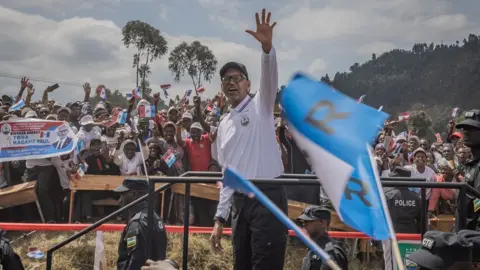 AFP
AFPMonday’s election offers little room for progress for Rwandan President Paul Kagame, who won nearly 99% of the vote last month.
The size of his victory in 2017, combined with his 95% in 2003 and 93% in 2010, raised some questions about how democratic the elections actually were.
Complaints that the previous refugee and rebellion chief had optimistically shrugged off.
“There are people who think there is no 100% democracy,” Mr Kagame told hundreds of cheering supporters at a campaign rally in western Rwanda last week.
Regarding elections in various places, without naming any particular nation, he said: “There are many people who are voted into office with 15%… Is that democracy? How?”
The President stressed that what happens in Rwanda is Rwanda’s business.
His supporters waved red, white and sky blue flags at the birthday party of the governing Rwandan Patriotic Front (RPF), chanting “They should come and learn”.
Standing over 6 feet (1.83 metres), the 66-year-old father of four cuts a stern and imposing figure among the crowd. He can crack a smile and a shaggy dog tale or two, though the bespectacled head can be a constant haste on the smile of a disgruntled old man.
His smooth, thoughtful delivery forces the listener to think and in most cases he is very direct when he speaks, sometimes mincing his words.
Even on occasions when he uses more cryptic or diplomatic language, he will use signs to let society know what he is talking about.
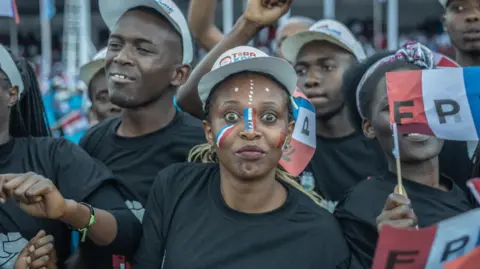 AFP
AFPMr Kagame’s tenure has been marked by fighting between Rwanda’s Tutsi and Hutu ethnic teams.
To overcome this, their executive now insists that the society be recognized as Rwandans rather than as a particular ethnic group.
President since 2000, he is serving a fourth term, although Mr. Kagame has been the de facto leader of the East African nation since July 1994. That’s when his rebel forces ousted the Hutu extremist government that had planned a genocide that year. ,
At first he served as Vice President and Defense Minister.
Many of his supporters, including some prominent Western politicians, respect him for bringing balance and rebuilding Rwanda after the genocide, in which 800,000 ethnic Tutsis and ethnic Hutus were killed.
Some accused his next rebel army of reprisal killings the same month, although his government has consistently maintained that they were isolated cases and that those responsible were punished.
The president does not hold back when it comes to criticizing the West, but he also sometimes tries to win their support by enjoying guilt over the failure to protest the genocide.
Rwanda was also a participant and financial beneficiary of Britain’s now-cancelled scheme to deport asylum seekers.
“Of course, I will vote for PK,” college student Mary Jean says of Mr. Kagame, using his initials.
“Look how well I am studying. If he hadn’t been president, I probably wouldn’t have been able to study well because of the lack of security,” she tells the BBC.
For her, the answer to who she would vote for was not hidden, but there are two alternative names on the ballot for the imagination of 90 lakh registered citizens.
Frank Habinza of the Democratic Green Party and incumbent Philip Mapeimana are both running for re-election in a repeat of the presidential election seven years ago.
However, just over 1% of the votes were cast between the two of them in last month’s round.
Alternative political parties have endorsed Mr Kagame for the presidency.
Opposition meat presser Dianne Rwigara, an outspoken critic of Mr Kagame, was once barred from attending the fields because she did not provide the proper forms, which she ignored as an excuse for curtailing her operations. Was.
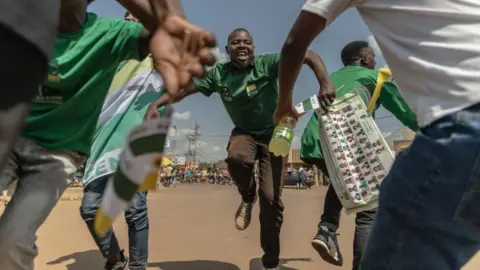 AFP
AFPMr Kagame has also been accused of silencing other potential warring parties through imprisonment and intimidation. He once told Al Jazeera news channel that he should no longer be held responsible for the weak opposition.
Their strong network of spies has reportedly carried out incidents of cross-border killings and kidnappings.
He is also said to have targeted his former boss, ex-intelligence Colonel Patrick Karegeya, who later fled Rwanda due to a rift with Mr Kagame.
Once in 2014, he was murdered in a luxurious resort in Johannesburg, the major city of South Africa.
“They literally used a rope to hang him tightly,” said David Batenga, Colonel Karegeya’s nephew.
Mr Kagame politely distanced himself from the killing, formally denying any involvement throughout the year.
A little later, he advised at a devotional meeting, “You can’t betray Rwanda and get punished for it.” “Nobody, even those still alive, will suffer the consequences. Anybody. It’s a matter of time.”
The president’s quest for security at home has led him to send troops into neighboring Democratic Republic of Congo, declaring that they are pursuing the Hutu rebel group. Rwanda could be accused of supporting M23 rebel activists there – something it denies, despite heaps of evidence, including A contemporary UN record,
“Frankly, (the election) is a sham,” says Philip Rantjens, reflecting on the ballot. The Belgian political scientist is a professional in the Superior Lakes region.
“Of course I don’t know what will happen this time, but the last elections… have been a circus.
“I mean the National Electoral Commission accounts for votes rather than counting votes,” he alleged, referring to the 2003 concluded European Union (EU) witness challenge records and the 2010 Commonwealth witness challenge records.
The Electoral Commission of Rwanda states on its website that it “conducts free, fair and transparent elections to promote democracy and good governance in Rwanda”.
“For me, the upcoming presidential elections in Rwanda are a non-event,” says Dr. Joseph Sebarenzi, a former speaker of the Rwandan parliament, who lost many lives and lives during the genocide, and now lives in exile. United States of america.
“An election is like a football game where the organizer is also a contestant, selecting other contestants, ordering people to participate in the game, and where everyone knows the pre-determined winner but treating him as such “It’s like the game is real.”
Mr Kagame, an avid football fan who closely follows English Premier League club Arsenal, would spare the details.
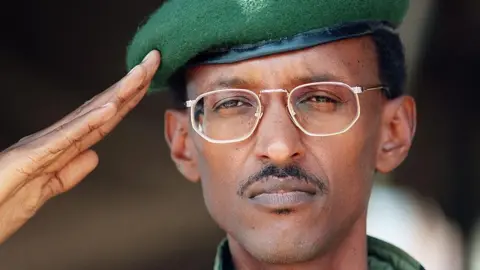 AFP
AFPBorn in 1957 to an affluent family in central Rwanda, he was the youngest of five children.
However, at the age of two, he became a refugee in neighboring Uganda, fleeing the persecution and genocide of the 1950s with his people and hundreds of others from the minority Tutsi community.
Despite having a one-month-old baby, Mr Kagame has said he can still “remember looking over the next hill.” We could see people burning houses there.
“They were killing people. My mother was very desperate. She didn’t want to leave this place,” the president advised American journalist and unofficial biographer Stephen Kinzer.
The killings occurred when Belgian colonists switched the ethnic group they supported from the majority Hutu ethnic group to favor the emerging ruling elite, some of whom had suffered abuses under the Tutsi monarchy.
Rwanda gained independence in 1962.
In the late 1970s, Mr. Kagame made a series of secret visits to the house.
While in the capital Kigali, he frequented an exclusive hotel in Kiyovu, one of the city’s wealthiest neighborhoods. Its bar was popular with politicians, security officers and civil servants who used to gossip while drinking beer after work.
Mr. Kinzer wrote that the future leader would listen to his conversation as he sat alone at a table and drank orange soda while avoiding attention.
These visits to his homeland increased his interest in the art of espionage.
He trained in military intelligence in Uganda and joined the successful rebellion in that country led by Yoweri Museveni, after whom he took power in 1986. Mr Kagame further trained in Tanzania, Cuba and the United States.
He then led his predominantly Tutsi rebel army that marched into Rwanda in 1990.
“(The training) was useful. Cuba, in its wars with the US and relations with Russia, was quite advanced in intelligence matters. Political education also took place: What is the struggle for? How do you maintain it?” He told Mr. Kinzer.
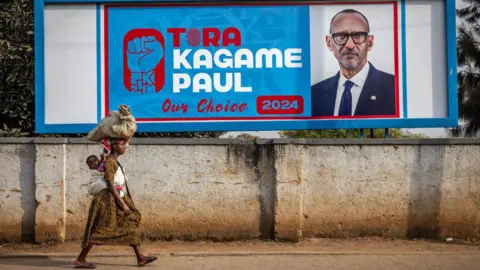 AFP
AFPHe has tried to continue the conflict by targeting economic development – Mr Kagame suggested Rwanda would emulate Singapore or South Korea and achieve development in a generation.
Although Rwanda fell short of its target of becoming a middle-income country by 2020, Professor Rentjens says, “it is a well-run country”.
“The problem in Rwanda is political governance, there is no level playing field, no room for opposition, no freedom of speech, (which) risks destroying the achievements of good technocratic governance.”
But Mr Kagame says the huge crowds of supporters at his rallies are an example of Rwandans’ confidence and love for him and their desire for him to remain their leader, although he once said he would not prepare a successor by 2017. Will take.
Due to constitutional changes, in theory, he could remain in power until 2034.
“The context of every country” matters, Mr. Kagame said in a live interview on the state broadcaster last month, addressing the issue during his time in power.
“(West says): ‘Oh, you’ve been there too long.’ But this is not your job, this is the job of these people here.”
Thousands of miles away in America, Dr. Sebrenzi says he does not know what the future holds for his home country, affectionately known as the Land of a Thousand Hills, but adds: “History shows that countries where states As the head of state is stronger than state institutions, power transitions can be violent, leading to a chaotic period following the regime.
More BBC stories about Rwanda:
 Getty Photographs/BBC
Getty Photographs/BBC




